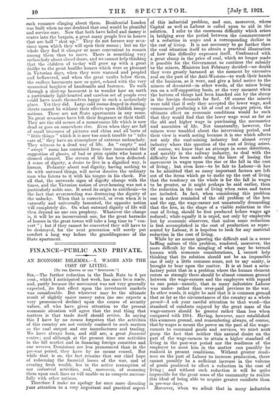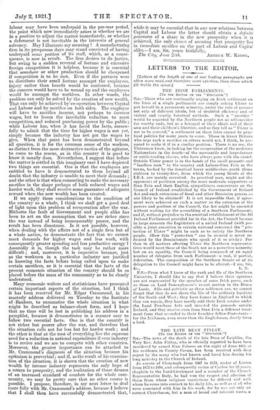FINANCE-PUBLIC AND PRIVATE.
AN ECONOMIC DILEMMA.—I. WAGES AND THE COST OF LIVING.
(To THE EDITOR OF THE " SPECTATOR.") SIR,—The further reduction in the Bank Rate to 6 per cent., which I anticipated last week, has since be3n made, and, partly because the movement was not very generally expected, its first effect upon the investment markets was considerable. But whatever may be the ultimate result of slightly easier money rates (no one expects a very pronounced decline) upon the course of security values, all who have given attention to the present economic situation will agree that the real thing that matters is that trade itself should revive. In saying this I have by no means forgotten that the activities of this country are not entirely confined to such matters as the coal output and our manufactures and trading. We have always been, and still are, a great financial centre ; and although at the present time our activities in the bill market and in financing foreign countries and our oversea Dominions are less pronounced than in the pre-war period, they have by no means ceased. But while that is so, the fact remains that our chief hope of redeeming the financial losses of the war, and of creating fresh wealth, lies in the active resumption of our industrial activities, and, moreover, of resuming them upon such lines as will enable us to compete success- fully with other nations.
Therefore I make no apology for once more directing your attention to a very important and practical aspect of this industrial problem, and one, moreover, where Capital as well as Labour is called upon to aid in the solution. I refer to the enormous difficulty which arises in bridging over the period between the commencement of a reduction in wages and a corresponding decline in the cost of tiring. It is not necessary to go further than the coal situation itself to obtain a practical illustration of how this difficulty expresses itself. Confronted with a great slump in the price of coal, which no longer made it possible for the Government to continue the subsidy to the miners, Ministers last February decided—no doubt they were greatly harassed at the moment by excessive zeal on the part of the Anti-Wasters—to wash their hands of the business, as it were, and give a brief notice to the miners of decontrol—in other words, of the mines being run on a self-supporting basis, at the very moment when the bottom of things had been knocked out by the slump in the foreign demands for fuel. Of course the miners were told that if only they accepted the lower wage, and commenced producing a lot of coal at cheaper prices, the ultiniste effect on economic conditions would be such that they would find that the lower wage went as far as the old and higher wage in purchasing the necessaries and amenities of life. Not unnaturally, however, the miners were troubled about the intervening period, and their view is worth noting because it is one which affects not only the coal-mining industry but almost every industry where this question of the cost of living arises. Of course, we know that an attempt in some directions, and notably in the railway industry, to deal with the difficulty has been made along the lines of basing the movement in wages upon the rise or the fall in the cost of living ; but even here—to be fair to Labour—it has to be admitted that so many important factors are left out of the items which go to make up the cost of living that the tendency on the whole is for the fall in wages to be greater, or it might perhaps be said earlier, than the reduction in the cost of living when rates and taxes are included. In fact, when considering this problem one is rather reminded of the old problem of the hen and the egg, the wage-earner not unnaturally demanding that the hen, in the shape of a visible reduction in the cost of living, should be first produced before wages ar reduced; while equally it is urged, not only by employers but by economic observers, that unless some reduction is first accomplished in the cost of production as repre- sented by Labour, it is hopeless to look for any material reduction in the cost of living.
While by no means ignoring the difficult and in a sense baffling nature of this problem, rendered, moreover, the more difficult by the mingling of what may be termed human with economic considerations, I, cannot help thinking that its solution should not be an impossible one if only a little common sense, not to say sanity, is brought to bear upon the matter. It is at least a, satis- factory point that in a problem where the human element enters so strongly there should be almost common ground between the wage-earners and the employers with regard to one point—namely, that in many industries Labour was under- rather than over-paid previous to the war. In other words, it might be said that it is common ground that so far as the circumstances of the country as a whole permit—I ask your careful attention to that word—the standard of comforts enjoyed by the great mass of the wage-earners should be greater rather than less when compared with 1914. Having, however, once established this 'common ground, and remembering always, of course, that by wages is meant the power on the part of the wage- earners to command goods and services, we must next grasp the fact that neither this natural desire on the part of the wage-earners to attain a higher standard of hying in the post-war period nor the readiness of the employer. to meet him in the matter can possibly be realized in present conditions. Without greater readi- ness on the part of Labour to increase production, there cannot possibly be a sufficient increase in the volume of .goods produced to effect a reduction in the cost of impossible ; and without such reduction it will be quite un.possible for the great mass of the community to realize this ideal of being able to acquire greater comforts than in pre-war days.
• Moreover, when we admit that in many industries labour may have been underpaid in the pre-war period, the point which now immediately arises is whether we are in a position to adjust the matter immediately, or whether a deferment is not inevitable in the interests of general solvency. May I illustrate my meaning ?, A manufacturing firm in its prosperous days may stand convicted of having underpaid some portion of its staff, which, as a conse- quence, is now in revolt. The firm desires to do justice, but owing to a sudden reversal of fortune and excessive foreign competition it is helpless, because it is essential that somehow or other production should be cheapened if competition is to be met. Even if the partners were to distribute their small fortune amongst the employees, injury rather than benefit would be conferred, because the concern would have to be wound up and the employees would be amongst the workless. In other words, the problem can only be solved by the creation of new wealth. That can only be achieved by co-operation between Capital and Labour and by sacrifice on both sides. The employer will have to sacrifice income, not perhaps to increase wages, but to lessen the inevitable reduction to meet competition, and reduced purchasing power by the public ; while Labour has, when it has faced the facts, sorrow- fully to admit that the time for higher wages is not yet, simply because the industry has not got the wages to give. When that point has been demonstrated beyond all question, it is for the common sense of the workers, as distinct from the mere destructive tactics of the agitator, to come to the rescue, as in this country it is good to know it usually does. Nevertheless, I suggest that before the matter is settled in this imaginary case I have depicted two things are essential. One is that the employees are entitled to have it demonstrated to them beyond all doubt that the industry is unable to meet their demands ; and the other is that when consenting to make the necessary sacrifice in the shape perhaps of both reduced wages and harder work, they shall receive some guarantee of adequate reward when the new wealth has been created.
If we apply these considerations to the condition of the country as a whole, I think' we shall get a good deal of light upon this problem of recuperation after the war.
Hitherto the fault of Government and people alike has been to act on the assumption that we are richer since the war instead of being immeasurably poorer, and the result has been disastrous. Is it not possible, however, when dealing with the affairs not of a single firm but of a whole nation, to demonstrate the fact that we cannot meet demands for higher wages and less work, with consequently greater spending and less productive energy ? Assuredly it is, though the task may be rather more difficult ; and, moreover, it is imperative because, just as the workmen in a particular industry are justified in knowing the facts before being called upon to make certain sacrifices, so it is essential that the facts of the present economic situation of the country should be so placed before the mass of the community as to be clearly understood.
Many economic writers and statisticians have presented certain important aspects of the situation, but I think it has been reserved for Mr. Edgar Crammond, in his masterly address delivered on Tuesday to the Institute of .Bankers, to summarize the whole situation in what might be described as balance-sheet form, and I hope that no time will be lost in publishing his address in a pamphlet, because it demonstrates in a manner easy to follow two essential facts. One is that the country is not richer but poorer after the war, and therefore that the situation calls not for less hut for harder work ; and the other is that-at the root of everything lies the supreme need for a reduction in national expenditure if ever industry is to revive and we are to compete with other countries. Moreover, the greater importance can be attached to Mr. Crammond's diagnosis of the situation because his optimism is proverbial; and if, as the result of his examina- tion of the situation, it is shown that the creation of new wealth by intense industry represents the only hope of a return to prosperity, and the realization of those dreams of an increased standard of comfort for the whole com- munity, we may be pretty sure that no other course is possible. I propose, therefore, in my next letter to deal more fully with Mr. Crammond's address, because I believe that I shall then have successfully demonstrated that, while it may be essential that in any new relations between Capital and Labour the latter should obtain a definite guarantee of a share in the new prosperity when it is achieved, the only chance of securing that prosperity lies in immediate sacrifice on the part of Labour and Capital alike.—I am, Sir, yours faithfully,











































 Previous page
Previous page